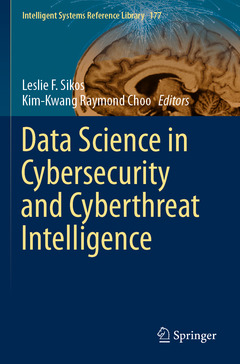Description
Data Science in Cybersecurity and Cyberthreat Intelligence, 1st ed. 2020
Intelligent Systems Reference Library Series, Vol. 177
Coordinators: Sikos Leslie F., Choo Kim-Kwang Raymond
Language: English
Subjects for Data Science in Cybersecurity and Cyberthreat Intelligence:
Publication date: 02-2021
Support: Print on demand
Publication date: 02-2020
129 p. · 15.5x23.5 cm · Hardback
Description
/li>Contents
/li>Biography
/li>Comment
/li>
This book presents a collection of state-of-the-art approaches to utilizing machine learning, formal knowledge bases and rule sets, and semantic reasoning to detect attacks on communication networks, including IoT infrastructures, to automate malicious code detection, to efficiently predict cyberattacks in enterprises, to identify malicious URLs and DGA-generated domain names, and to improve the security of mHealth wearables. This book details how analyzing the likelihood of vulnerability exploitation using machine learning classifiers can offer an alternative to traditional penetration testing solutions. In addition, the book describes a range of techniques that support data aggregation and data fusion to automate data-driven analytics in cyberthreat intelligence, allowing complex and previously unknown cyberthreats to be identified and classified, and countermeasures to be incorporated in novel incident response and intrusion detection mechanisms.
Dr. Leslie F. Sikos is a computer scientist specializing in network forensics and cybersecurity applications powered by artificial intelligence and data science. He has worked in both academia and the industry and acquired hands-on skills in datacenter and cloud infrastructures, cyberthreat management, and firewall configuration. He regularly contributes to major cybersecurity projects in collaboration with the Defence Science and Technology Group of the Australian Government, CSIRO’s Data61, and the CyberCRC. He is a reviewer of journals such as Computers & Security and Crime Science and chairs sessions at international conferences on AI in cybersecurity. Dr. Sikos holds professional certificates and is a member of industry-leading organizations, such as the ACM, the IEEE Special Interest Group on Big Data for Cyber Security and Privacy, and the IEEE Computer Society Technical Committee on Security and Privacy.
Prof. Kim-Kwang Raymond Choo received a Ph.D. in Information Security in 2006 from the Queensland University of Technology, Australia. He currently holds a Cloud Technology Endowed Professorship at The University of Texas at San Antonio, USA, and has a courtesy appointment at the University of South Australia, Australia. He serves on the editorial board of Computers & Electrical Engineering, Computers & Security, Cluster Computing, Digital Investigation, IEEE Access, IEEE Blockchain Newsletter, IEEE Cloud Computing, IEEE Communications Magazine, IEEE Transactions on Big Data, Future Generation Computer Systems, Journal of Network and Computer Applications, PLoS ONE, Soft Computing, etc. He also serves as the Special Issue Guest Editor of ACM Transactions on Embedded Computing Systems (2017), ACM Transactions on Internet Technology (2016), Applied Soft Computing (2018), Computers & Electrical Engineering (2017), Computers & Security (2018), Digital Investigation (2016), Future Generation Computer Systems (2016, 2018), IEEE Access
Presents the state of the art in cybersecurity, and critically reviews existing approaches
Addresses the intersection of two hot topics: cybersecurity and data science
Includes an essential introduction to field
These books may interest you

Practical AI for Cybersecurity 142.04 €

AI in Cybersecurity 168.79 €

AI in Cybersecurity 168.79 €

